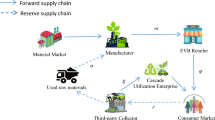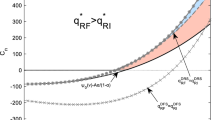Abstract
The importance of reasonable pricing strategy for electric vehicle batteries under the background of government subsidies has been recognized. However, variable government subsidy policy may highly impact the pricing strategy of electric vehicle batteries recycling market in its infancy. There is an urgent need to discover the hidden electric vehicle batteries relation, give the pricing strategy, and suggest the effective policy design. The paper studies the optimal pricing strategies for electric vehicle batteries in three different Chinese recycling channels in the government subsidies situation by using Stackelberg game. And then, the model is simulated in decentralized decision-making and centralized decision-making, respectively, to explain the relationship among parameters using MATLAB. Finally, a numerical experiment derived from the market data of electric vehicles in China and existing literature is used to show the effectiveness of Stackelberg model, proving that our approach can contribute to closed-loop supply chain pricing strategy for electric vehicle batteries recycling under government subsidies. Results show that the government should increase the subsidy of electric vehicle batteries recycling and urge the electric vehicle enterprises to take responsibility of batteries recycling. The total profit of the closed-loop supply chain with centralized decision-making is higher than the decentralized decision-making, so the upstream and downstream of the supply chain should strengthen communication to achieve profit growth. It significantly provides a theoretical basis for the enterprises in the electric vehicle batteries recycling closed-loop supply chain to formulate pricing strategies under three recycling models and provides suggestion for the government in the designing power battery recycling subsidy policy.












Similar content being viewed by others
References
Babar, A. H. K., Ali, Y., & Khan, A. U. (2021). Moving toward green mobility: overview and analysis of electric vehicle selection, Pakistan a case in point. Environment, Development and Sustainability 1–18.
Boronoos, M., Mousazadeh, M., & Torabi, S. A. (2021). A robust mixed flexible-possibilistic programming approach for multi-objective closed-loop green supply chain network design. Environment, Development and Sustainability.
Ding, H., Zhao, Q., An, Z., Xu, J., & Liu, Q. (2015). Pricing strategy of environmental sustainable supply chain with internalizing externalities. International Journal of Production Economics 170.
Fazli-Khalaf, M., Naderi, B., Mohammadi, M., & Pishvaee, M. S. (2021). The design of a resilient and sustainable maximal covering closed-loop supply chain network under hybrid uncertainties: a case study in tire industry. Environment, Development and Sustainability 1–25.
Ferro, G., Minciardi, R., Parodi, L., & Robba, M. (2021). Discrete event optimization of a vehicle charging station with multiple sockets. Discrete Event Dynamic Systems, 31, 219–249.
Ghasemzadeh, Z., Sadeghieh, A., & Shishebori, D. (2021). A stochastic multi-objective closed-loop global supply chain concerning waste management: A case study of the tire industry. Environment, Development and Sustainability.
Gu, X., Zhou, L., Huang, H., Shi, X., & Ieromonachou, P. (2021). Electric vehicle battery secondary use under government subsidy: A closed-loop supply chain perspective. International Journal of Production Economics, 234, 108035.
Ieromonachou, P., Gu, X., Zhou, L., & Tseng, M. L. (2017). Optimising quantity of manufacturing and remanufacturing in an electric vehicle battery closed-loop supply chain. Industrial Management & Data Systems, 118, 00–00.
Jia, Y., & Li, C. (2018). Recycling modes of power batteries of new energy vehicles based on principal behavior. In: 2018 5th International Conference on Industrial Economics System and Industrial Security Engineering (IEIS), (pp. 1–6).
Li, L., Guo, S., Cai, H., Wang, J., & Ni, Y. (2020). Can China’s BEV market sustain without government subsidies?: An explanation using cues utilization theory. Journal of Cleaner Production, 272, 122589.
Li, X., Du, J., Cheng, Y., Hanif, S., Mu, D., & Cui, Y. (2019). ELECTRIC VEHICLE BATTERY RECYCLING: SYSTEM DYNAMICS GAME BASED ANALYSIS FOR THE INFLUENCING FACTORS. Environmental Engineering & Management Journal, 18, 1123–1136.
Liu, Z., & Nishi, T. (2019). An evolutionary game model in closed-loop supply chain. In: 2019 IEEE International Conference on Industrial Engineering and Engineering Management (IEEM), (pp. 896–900).
Liu, Y., Xia, Z. J., Shi, Q. Q., & Xu, Q. (2021). Pricing and coordination of waste electrical and electronic equipment under third-party recycling in a closed-loop supply chain. Environment, Development and Sustainability 1–18.
Liu, K., & Wang, C. (2021). The impacts of subsidy policies and channel encroachment on the power battery recycling of new energy vehicles. International Journal of Low-Carbon Technologies.
Meshram, P., & Pandey, B. D., Abhilash. (2019). Perspective of availability and sustainable recycling prospects of metals in rechargeable batteries—A resource overview. Resources Policy 60: 9–22
Mitra, S., & Webster, S. (2008). Competition in remanufacturing and the effects of government subsidies. International Journal of Production Economics, 111, 287–298.
Mondal, C., Giri, B. C., & Biswas, S. (2021). Integrating corporate social responsibility in a closed-loop supply chain under government subsidy and used products collection strategies. Flexible Services and Manufacturing Journal 1–36.
Moore, E. A., Russell, J. D., Babbitt, C. W., Tomaszewski, B., & Clark, S. S. (2020). Spatial modeling of a second-use strategy for electric vehicle batteries to improve disaster resilience and circular economy. Resources, Conservation and Recycling, 160, 104889.
PAN, B., Yue, L., Wenliang, and Xiaoyan. (2020). "Closed-loop supply chain pricing strategy for patented products under two recycling and remanufacturing modes." In.
Quw S. Q., Chen-Bo, L. I., Jia, Y. L. (2018). Game study on recycling network of waste power batteries, Chinese Journal of Power Sources.
Rezaei, S., & Maihami, R. (2019). Optimizing the sustainable decisions in a multi-echelon closed-loop supply chain of the manufacturing/remanufacturing products with a competitive environment. Environment, Development and Sustainability 22.
Shao, L., Yang, J., & Zhang, M. (2017). Subsidy scheme or price discount scheme? Mass adoption of electric vehicles under different market structures. European Journal of Operational Research 262
Shao, Y., Deng, X., Qing, Q., & Wang, Y. (2018). Optimal battery recycling strategy for electric vehicle under government subsidy in China. Sustainability
Singh, A., & Letha, S. S. (2019). Emerging energy sources for electric vehicle charging station. Environment, Development and Sustainability, 21, 2043–2082.
Wang, L., Wang, X., & Yang, W. (2020). Optimal design of electric vehicle battery recycling network–From the perspective of electric vehicle manufacturers. Applied Energy, 275, 115328.
Xing, K. (2016). Under the background of government subsidy mechanism of closed- loop supply chain pricing strategy research. Logistics Engineering and Management.
Xu, G., Xu, K., Zheng, C., Zhang, X., & Zahid, T. (2016). Fully electrified regenerative braking control for deep energy recovery and safety maintaining of electric vehicles. IEEE Transactions on Vehicular Technology, 65, 1186–1198.
Yu, H., Dai, H., Tian, G., Xie, Y., Wu, B. (2020). Big-data-based power battery recycling for new energy vehicles: Information sharing platform and intelligent transportation optimization. IEEE Access 1–1.
Zhao, J. H., Lin, J., Management S. O. (2017). Pricing models of closed-loop supply chain under different subsidy policies. Journal of Industrial Engineering and Engineering Management.
Zheng, Z., Chen, M., Wang, Q., Zhang, Y., Ma, X., Shen, C., Xu, D., Liu, J., Liu, Y., Gionet, P. (2018). High performance cathode recovery from different electric vehicle recycling streams. ACS Sustainable Chemistry & Engineering 6.
Zu-Jun, M., Zhang, N., Dai, Y., & Hu, S. (2016). Managing channel profits of different cooperative models in closed-loop supply chains. Omega, 59, 251–262.
Author information
Authors and Affiliations
Corresponding authors
Additional information
Publisher's Note
Springer Nature remains neutral with regard to jurisdictional claims in published maps and institutional affiliations.
Rights and permissions
About this article
Cite this article
Zhao, X., Peng, B., Zheng, C. et al. Closed-loop supply chain pricing strategy for electric vehicle batteries recycling in China. Environ Dev Sustain 24, 7725–7752 (2022). https://doi.org/10.1007/s10668-021-01755-9
Received:
Accepted:
Published:
Issue Date:
DOI: https://doi.org/10.1007/s10668-021-01755-9




